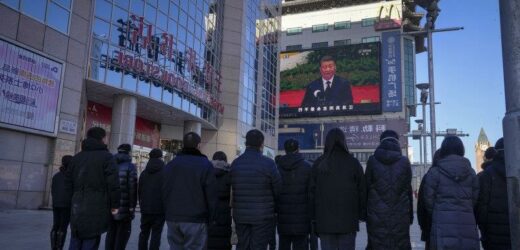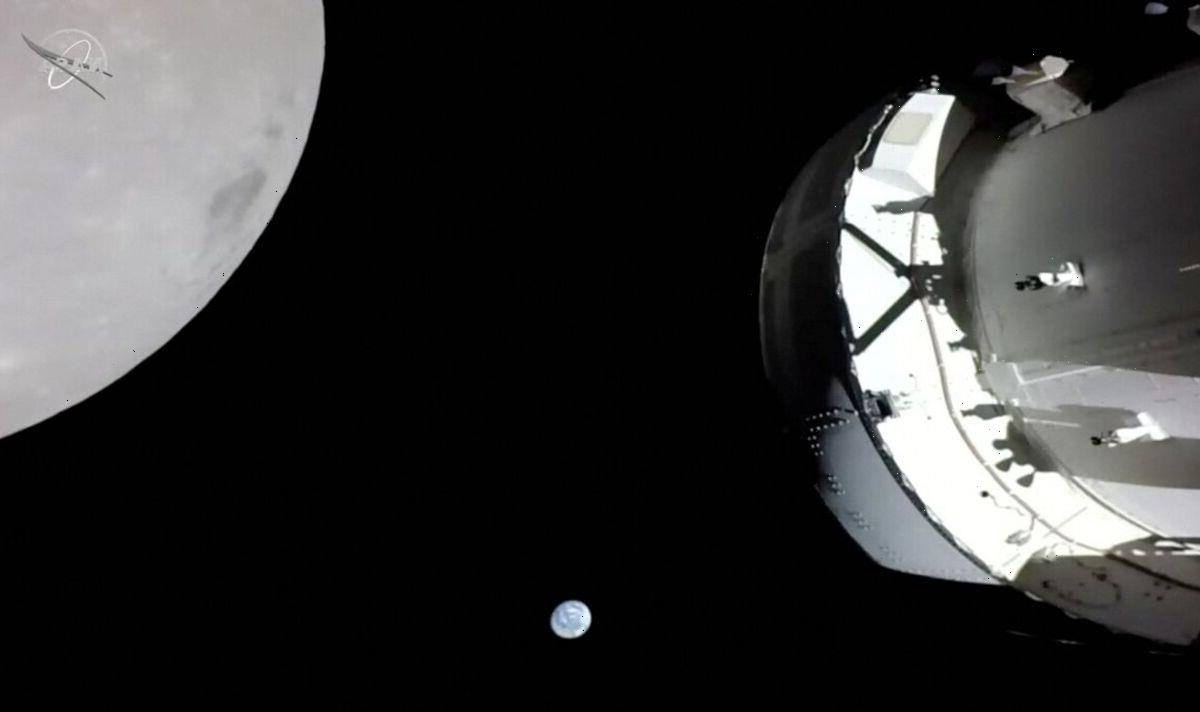In the cavernous Great Hall of the People in central Beijing, Jiang Zemin, the president who led China through a decade of double-digit economic growth, towered five metres tall over a thousand delegates.
The Chinese Communist Party elite bowed, dressed in black, with white flowers pinned to their lapels. They stood for more than an hour, to pay tribute to the man affectionately known as “uncle toad” for his oversized glasses that contrasted with his cosmopolitan Shanghai spirit and his mission to transform the CCP from a revolutionary party to a ruling one.
Attendees bow during a formal memorial for the late former Chinese President Jiang Zemin held in Beijing. Credit:AP
Behind them, a black banner revealed how much has changed since Jiang left office in 2002, when Bo Xilai, Xi’s great rival, was governor of Liaoning province, and Premier Li Keqiang led Henan. Both have since been vanquished, along with the whispers of internal democratic reform that once made their way around the capital.
“Under the leadership of the Party Central Committee with Comrade Xi Jinping at the core, we will inherit the will of Comrade Jiang Zemin and push forward the great cause of socialism with Chinese characteristics in the new era,” one banner draped across Jiang’s state funeral read on Tuesday.
Even in death, Jiang could not escape Xi's shadow. The Chinese president frequently began his remarks with “Comrade Jiang understood” that what he was trying to achieve was essential to the survival of the party and the country.
Comrade Jiang understood “building the great pride of history”, comrade Jiang cared about the “great cause of socialism with Chinese characteristics", comrade Jiang understood “the Belt and Road Initiative,” Xi said, paying tribute to his own trillion-dollar infrastructure program.
People watch a live broadcast of the memorial service for late former Chinese President Jiang Zemin. Credit:AP
Xi, under a modicum of pressure from protests and his zero-COVID policy at home, transformed Jiang’s funeral into a defence of his own legacy.
“The leadership of the Chinese Communist Party is the basic guarantee for our party and our people to forge ahead,” he said.
The People’s Daily was more explicit. On Tuesday, it urged the Party to rally around Xi in mourning Jiang to “carry on the mission of national rejuvenation”.
Outside the Great Hall, sirens blared across the city, stock trading was halted, online video games were blocked and thousands laid flowers in front of Jiang’s former home in Yangzhou.
In Beijing, residents were told negative COVID tests would no longer be needed to enter many public venues. The capital followed Shanghai and Shenzhen after a week of protests not seen since 1989, when Jiang was selected as the urbane compromise candidate to lead China after the Tiananmen Square massacre.
Chinese President Xi Jinping leads other officials to bow during a formal memorial for the late former Chinese President Jiang ZeminCredit:AP
Tiananmen itself was empty, Beijing’s vast security apparatus made sure there could be no more outpourings of grief transformed into political resistance.
“We feel a sense of tragedy towards the future of China,” one protester told Reuters last week before the protest movement leaders were dragged away.
Jiang was “a caretaker ruler, not a reformer” observed the Harvard Business Review in 2002, but his contrast with Xi transformed his reputation over the next two decades. By last week, China was filled with anecdotes of him playing ukulele in Hawaii, reciting Abraham Lincoln’s Gettysburg Address, and remonstrating with Chinese journalists for being “too simple, too naive” in their questions.
“He was an extremely unusual and extraordinary individual,” said Dr Hu We, who heard Jiang speak at Shanghai Jiao Tong University.
It was a different time. China was growing wealthy and more powerful, but still had 100 million people living in poverty. Jiang came up with a 28-word policy to continue his predecessor Deng Xiaoping’s maxim that “China should neither take the lead nor carry the flag”.
“Observe calmly, secure our position, take one’s time before reacting, hide our capacities and bide our time, maintain a low profile, and never claim leadership,” Jiang said.
The strategy held until 2012 when Xi came to power and overturned decades of policy orthodoxy to demand a new, more powerful China, take its place on the world stage.
“We will not accept sanctimonious preaching from those who feel they have the right to lecture us,” Xi said last year.
“We will never allow any foreign force to bully, oppress, or subjugate us. Anyone who would attempt to do so will find themselves on a collision course with a great wall of steel forged by over 1.4 billion Chinese people.”
Xi’s ambitions have heralded new forms of crackdown at home, restrictions on public discourse, and destroyed challenges to the Communist Party’s authority.
In death, Jiang, the compromise candidate became the symbol of compromise himself.
“RIP, to you, and the era,” said one protester last week.
Most Viewed in World
From our partners
Source: Read Full Article





